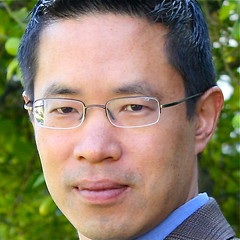
Patrick Lin
Director, Ethics + Emerging Sciences Group, California Polytechnic State University
Military 2.0:
Ethical Issues in Human Enhancement and Robotics
For better or worse, the military is a major driver of technological, world-changing innovations, such as the Internet. At the same time, wars and armed conflicts are a key roadblock in the evolution of humanity. Therefore, to understand how emerging technologies will change our lives, we must look at their military origins as a harbinger of things to come for society at large. This presentation will focus on ethical and policy questions arising from two key areas making headlines today and in the future: human enhancement technologies and robotics.
For instance, are there moral or practical issues with eliminating human emotions such as fear or anger, which have led to abuses and accidents in wartime? Must these enhancements (and others, such as super-strength) be temporary or reversible, considering that soldiers usually return to civilian life? Robots can discourage such abuses if equipped with cameras, becoming objective and unblinking observers on the battlefield, but would this erode cohesion and trust among soldiers – and in the civilian realm, would surveillance robots infringe on our privacy? Generally, would these new technologies make it easier to engage in war, since they would lower political costs by reducing the number of casualties on our side – if so, is it immoral, or otherwise counterproductive to humanity's progress, to develop these capabilities?
Patrick Lin is the director of the Ethics + Emerging Sciences Group , based at California Polytechnic State University, San Luis Obispo. Most recently, he has led research efforts that culminated in two major reports: Autonomous Military Robotics: Risk, Ethics, and Design (funded by the U.S. Dept. of Defense/Navy, 2008) and Ethics of Human Enhancement: 25 Questions & Answers (funded by the U.S. National Science Foundation, 2009). He has published several books and papers in the field of technology ethics, including a new monograph What Is Nanotechnology and Why Does It Matter?: From Science to Ethics (Wiley-Blackwell, 2010) and a forthcoming anthology Robot Ethics: The Social and Ethical Implication of Robotics (MIT Press, in preparation). Dr. Lin earned his B.A. from University of California at Berkeley, M.A. and Ph.D. from University of California at Santa Barbara, and completed a three-year post-doctoral appointment at Dartmouth College. He is currently an assistant professor in Cal Poly’s philosophy department and an ethics fellow at the U.S. Naval Academy.
